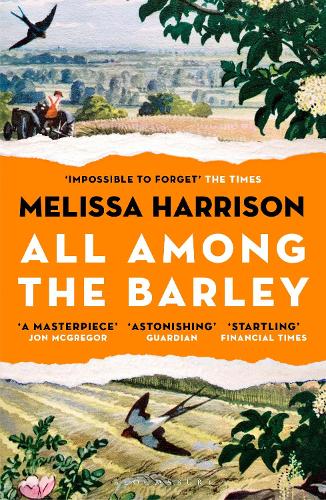
Set
in 1930s Suffolk, Melissa Harrison’s All
Among the Barley is an atmospheric evocation of an English way of life
which was constantly evolving but which would change beyond recognition in a
few short years. The community it describes – farmers who have farmed the land
for generations – is rooted in tradition, the old ways, even witchcraft, but it
is also pragmatic. Farming is a way of life, a vocation, but above all it is a
business, and one that must change and adapt in order to survive. At first All Among the Barley appears to be a
subtle and seemingly mellow novel, but its undercurrents grow gradually darker
as the story unfolds.
We
are in a time before industrialisation, when the land was managed by hand, with
horses and only the most rudimentary equipment. The pain of the First World War
is still being felt, even sixteen years on, with a lack of manpower and an
economic hardship that steadily built through those inter-war years. In the
middle of this is the novel’s narrator, Edie Mather, fourteen at the time the
action unfolds and an ingenue who much prefers her own company to anyone
else’s, a clever girl who lives in her own head and in the countryside which
she describes in exquisite detail. The evocation of rural life is truly beautiful.
This
is not some bucolic idyll, however. We see the story through Edie’s uncomprehending
eyes, and we can discern what she cannot, the casual racism and anti-semitism
and petty nationalism and grinding poverty which were used by Oswald Mosley and
his British Union of Fascists in the 1930s to seed their repellent worldview in
unsophisticated and vulnerable communities. We see the superstition that clings
to rural life. We see the hardship which, at times, trumps community, where the
consequences of accidents are measured not in human terms but in economic, and
where compassion can become a rare commodity.
And
through it all, Edie battles her own demons, oblivious that there is anything
wrong with her, blaming herself for every mishap, misinterpreting everything
around her. She places herself at the centre of events which unfold only in her
own mind. Meanwhile, real life grips its claws ever more tightly around her,
until we reach a climax which is truly shocking.
All Among the Barley is a very fine novel, thought –provoking and
memorable. Edie Mather, seemingly insignificant in her own community, is a
compelling and tragic sister to Sylvia Plath’s Esther Greenwood or Carson
McCullers’s Mick Kelly or Frankie Addams. Like those young women, you wish them
well while fearing the worst.
No comments:
Post a Comment